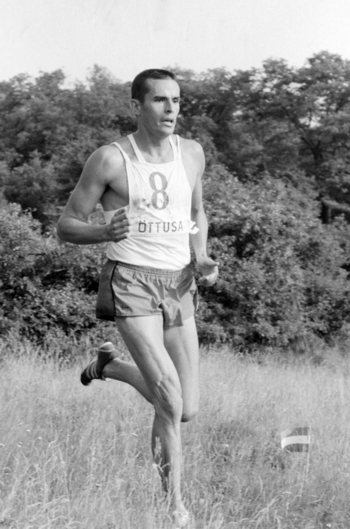Andras Balczo
András Balczó was 15 when, in 1953, he learned that Gábor Benedek, his compatriot, had won the individual gold medal in the Modern Pentathlon World Championships in Chile.
This news was a turning point that would determine the future course of his life, because he thought that if Gábor succeeded, he could do it as well with assiduous work. Until 1956 he was a triathlete in Nyíregyháza, where he was already distinguished by his excellent physical abilities and great results in shooting.
Andras Balczo's biography
András Balczó was 15 when, in 1953, he learned that Gábor Benedek, his compatriot, had won the individual gold medal in the Modern Pentathlon World Championships in Chile.
This news was a turning point that would determine the future course of his life, because he thought that if Gábor succeeded, he could do it as well with assiduous work. Until 1956 he was a triathlete in Nyíregyháza, where he was already distinguished by his excellent physical abilities and great results in shooting.
He arrived in Budapest in the summer of 1956 with a small suitcase containing the most necessary items and a slab of salted bacon.
 He was signed on by Csepel Sports Club under the direction of Ferenc Benedek, where - initially besides a daily shift of eight hours’ factory work - he began training in every discipline of pentathlon.
He was signed on by Csepel Sports Club under the direction of Ferenc Benedek, where - initially besides a daily shift of eight hours’ factory work - he began training in every discipline of pentathlon.
Until the end of his sports career, marked by the 1972 Olympic Games in Munich, he would remain faithful to his club, but from 1962 he became his own coach in physical sports and measured out the load in swimming and running. Since in his self-esteem he realised that he was not more talented than his most serious opponents, he decided to train more than they did with the goal of winning at least as much as he could.
From 1959 onwards, he achieved numerous successes at the World Championships and Olympic Games and his career was crowned by the Munich 1972 Olympic Games gold medal. In this competition he considered Fencing to be a turning point.
The mental capabilities of a competitor can often have a major influence on their effectiveness. In Munich, the incredibly successful start (12V/0D; 17V/3D) sparked the hope of winning the gold medal that a whole country had expected from him.
This expectation had made him so inhibited that successive defeats left him convinced that he would not win. The feeling of resignation made him so liberated and resulted in such a cheerful state that he felt there was a higher power fencing in his place for the remaining bouts. András Balczó was always helped by a deep conviction in faith in difficult psychological situations.
After almost two decades of his sports career, he did not break away from Modern Pentathlon. For another six years he supported the Hungarian pentathletes in Riding, his favourite discipline.
As a horse trainer, he rode five horses a day and corrected the mistakes and bad automatic responses that were left by less-trained riders.
András Balczó's life was immortalized by a feature film entitled Mission, a movie that was a hit in Hungary and was also featured in the USA, Canada and Germany with subtitles. The title of the film describes perfectly his path of life. During the 45 years since the end of his active career, he has presented 2,300 lectures, using his experiences of faith, biblical and literary education to tackle the psychological difficulties of the participants.
This life story is not complete without mention of the loving care he provides for his 12 children together with his wife Mónika Császár, a former Olympic gymnast. At the time of publication nine of them are already university graduates, two are attending university and the youngest, aged 19, is preparing for high-school graduation and university studies.
The Hungarian community of Modern Pentathlon has been delighted by the fact that besides numerous Hungarian and international accolades, András Balczó was among the first members of the UIPM Hall of Fame.
